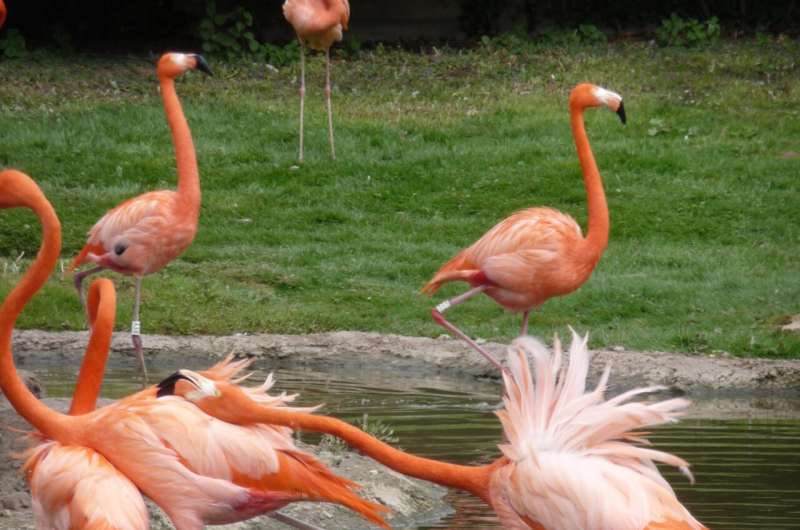This article has been reviewed according to Science X's editorial process and policies. Editors have highlighted the following attributes while ensuring the content's credibility:
fact-checked
peer-reviewed publication
trusted source
proofread
Flamingos found to form cliques with like-minded pals

Flamingos form cliques of like-minded individuals within their flocks, new research shows.
Scientists analyzed the personalities and social behavior of Caribbean and Chilean flamingos. Birds of both species tended to spend time with others whose personalities were similar to their own.
The study, by the University of Exeter and the Wildfowl & Wetlands Trust (WWT), reveals the complex nature of flamingo societies and could help in the management of captive flocks.
"Our previous research has shown that individual flamingos have particular 'friends' within the flock," said Dr. Paul Rose, from WWT and Exeter's Center for Research in Animal Behavior.
"In this study, we wanted to find out whether individual character traits explain why these friendships form.
"The answer is yes—birds of a feather flock together.
"For example, bolder birds had stronger, more consistent ties with other bold birds, while submissive birds tended to spend their time with fellow submissive flamingos."
The "personality" of flamingos was assessed by measuring consistent individual differences, such as aggressiveness and willingness to explore.
"Like humans, flamingos appear to carve out different roles in society based on their personality," said Fionnuala McCully, now at the University of Liverpool, who collected data for the study during an MSc Animal Behavior course at the University of Exeter.
"For example, we observed groups of aggressive birds which attempt to dominate rivals and tend to get in more fights.
"Meanwhile, the role of submissive birds may be more complex than simply being lower down the pecking order—they may be using a different approach to get what they need.
"The various different personality groups provide social help to their members, for example by supporting each other in the many squabbles that take place in flamingo flocks."
In the Caribbean flamingos, birds of a certain personality type had a particular role within the group overall, but this was not found in the Chilean flock. The reasons for this are unclear, and it's possible that a larger study of wild birds would find such a pattern.
Dr. Rose said, "Our findings need further investigation, both to help us understand the evolution of social behavior and to improve the welfare of zoo animals.
"But it is clear from this research that a flamingo's social life is much more complicated than we first realized."
The findings are based on observations of captive flamingos at WWT Slimbridge.
The paper, published in the journal Scientific Reports, is titled "Individual personality predicts social network assemblages in a colonial bird."
More information: Fionnuala R. McCully et al, Individual personality predicts social network assemblages in a colonial bird, Scientific Reports (2023). DOI: 10.1038/s41598-023-29315-3
Journal information: Scientific Reports
Provided by University of Exeter




















